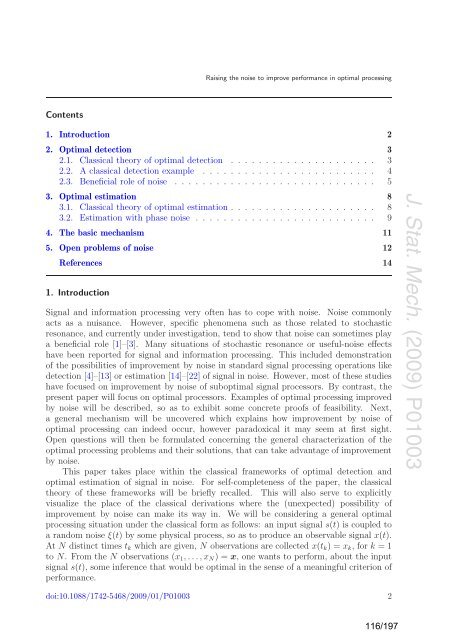a la physique de l'information - Lisa - Université d'Angers
a la physique de l'information - Lisa - Université d'Angers
a la physique de l'information - Lisa - Université d'Angers
You also want an ePaper? Increase the reach of your titles
YUMPU automatically turns print PDFs into web optimized ePapers that Google loves.
Contents<br />
Raising the noise to improve performance in optimal processing<br />
1. Introduction 2<br />
2. Optimal <strong>de</strong>tection 3<br />
2.1. C<strong>la</strong>ssical theory of optimal <strong>de</strong>tection . . . . . . . . . . . . . . . . . . . . . 3<br />
2.2. A c<strong>la</strong>ssical <strong>de</strong>tection example . . . . . . . . . . . . . . . . . . . . . . . . . 4<br />
2.3. Beneficial role of noise . . . . . . . . . . . . . . . . . . . . . . . . . . . . . 5<br />
3. Optimal estimation 8<br />
3.1. C<strong>la</strong>ssical theory of optimal estimation . . . . . . . . . . . . . . . . . . . . . 8<br />
3.2. Estimation with phase noise . . . . . . . . . . . . . . . . . . . . . . . . . . 9<br />
4. The basic mechanism 11<br />
5. Open problems of noise 12<br />
References 14<br />
1. Introduction<br />
Signal and information processing very often has to cope with noise. Noise commonly<br />
acts as a nuisance. However, specific phenomena such as those re<strong>la</strong>ted to stochastic<br />
resonance, and currently un<strong>de</strong>r investigation, tend to show that noise can sometimes p<strong>la</strong>y<br />
a beneficial role [1]–[3]. Many situations of stochastic resonance or useful-noise effects<br />
have been reported for signal and information processing. This inclu<strong>de</strong>d <strong>de</strong>monstration<br />
of the possibilities of improvement by noise in standard signal processing operations like<br />
<strong>de</strong>tection [4]–[13] or estimation [14]–[22] of signal in noise. However, most of these studies<br />
have focused on improvement by noise of suboptimal signal processors. By contrast, the<br />
present paper will focus on optimal processors. Examples of optimal processing improved<br />
by noise will be <strong>de</strong>scribed, so as to exhibit some concrete proofs of feasibility. Next,<br />
a general mechanism will be uncovered which exp<strong>la</strong>ins how improvement by noise of<br />
optimal processing can in<strong>de</strong>ed occur, however paradoxical it may seem at first sight.<br />
Open questions will then be formu<strong>la</strong>ted concerning the general characterization of the<br />
optimal processing problems and their solutions, that can take advantage of improvement<br />
by noise.<br />
This paper takes p<strong>la</strong>ce within the c<strong>la</strong>ssical frameworks of optimal <strong>de</strong>tection and<br />
optimal estimation of signal in noise. For self-completeness of the paper, the c<strong>la</strong>ssical<br />
theory of these frameworks will be briefly recalled. This will also serve to explicitly<br />
visualize the p<strong>la</strong>ce of the c<strong>la</strong>ssical <strong>de</strong>rivations where the (unexpected) possibility of<br />
improvement by noise can make its way in. We will be consi<strong>de</strong>ring a general optimal<br />
processing situation un<strong>de</strong>r the c<strong>la</strong>ssical form as follows: an input signal s(t) is coupled to<br />
a random noise ξ(t) by some physical process, so as to produce an observable signal x(t).<br />
At N distinct times tk which are given, N observations are collected x(tk) =xk, fork =1<br />
to N. FromtheN observations (x1,...,xN) =x, one wants to perform, about the input<br />
signal s(t), some inference that would be optimal in the sense of a meaningful criterion of<br />
performance.<br />
doi:10.1088/1742-5468/2009/01/P01003 2<br />
116/197<br />
J. Stat. Mech. (2009) P01003


